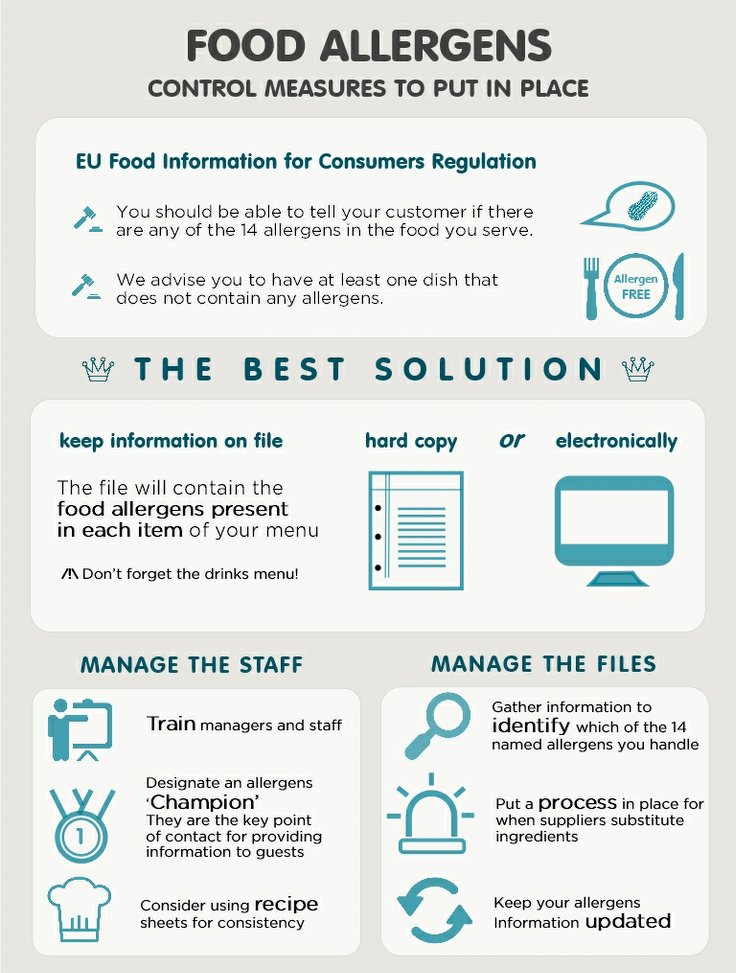Why is this guide important?
2% of the UK population are affected by allergies, food intolerances, or coeliac disease. These people must be incredibly careful about what they eat, as ingesting certain foods can cause painful and potentially fatal bodily reactions. They know sometimes it can be quite difficult to manage a diet, especially when dining out. Hopefully, not anymore.
Last December, the new Food Information Regulations were introduced. Now business selling loose foods that are not packaged have to specify whether 14 allergenic ingredients are in the foods they sell. This includes cafes, takeaways, bars, pubs and restaurants.
This regulation means that there is now a legal requirement for food businesses to provide this information either verbally or in writing.
Statistics show that most food allergy deaths in the UK occur when food is consumed outside of the home by undeclared ingredients known to cause allergic reactions. This is why it has been so important for the FSA and local authorities to work with food businesses, as providing accurate food allergen information is potentially lifesaving.
What the law says
In December 2014 the law was updated as to how information regarding allergens must be given to customers. This change meant that 14 allergens must be identified in the food that is being sold. Establishments must make the information available and then be in a position to actively inform their customers about the presence of all 14 allergens used as ingredients in their dishes. More allergens could be included, however this is not legally required, and is at the discretion of the business to supply this information. Fines of up to £5000 per infraction can be given for failure to comply with the new law.
Communicating to your customers
It is up to the food business how they inform their customers about the allergens in their food. Some examples of how this can be done include:
- • Clearly identifying allergens in the menu, or providing a separate allergen menu.
- • Written down and on display for the customer.
- • Provided orally by a member of staff, who must be trained in this information. This is particularly important, as currently only 17% of diners trust front of house staff with this type of information1.
- • In a folder or booklet that is readily available to customers
Keeping staff in the know
For the protection of both the business and the customer, the following steps can be taken to ensure staff are fully informed of allergenic customers:
- • Verbal communication to inform the wait staff or chef of allergies and intolerances may be advised.
- • Have a system in place on how to continuously instruct the wait staff.
- • If staff are unsure of whether or not a dish contains an allergen, it is best to advise customers to avoid that dish, in order to minimize the risk.
- • The training of competent persons both in the kitchen and front of house who are to be involved in the taking of orders and the preparation of allergen free foods.
- • Training all staff that handle or serve food in Allergen Awareness, to improve their knowledge regarding the dangers of allergens and the company procedures for dealing with an allergy enquiry.
- • Writing down the allergens of customers when placing their order, so their needs are not forgotten by mistake is always best. It helps avoid any miscommunication that a verbal instruction to inform the waiting staff or chef of allergies and intolerances might cause.
- • Washing all equipment before using it to prepare a dish for an allergenic customer, to avoid cross contamination. Simply wiping equipment is ineffective.
This will prove incredibly helpful for allergenic customers. Only 20% of them would want more menu options, but 60% would like clearer signposting of allergen ingredients.
